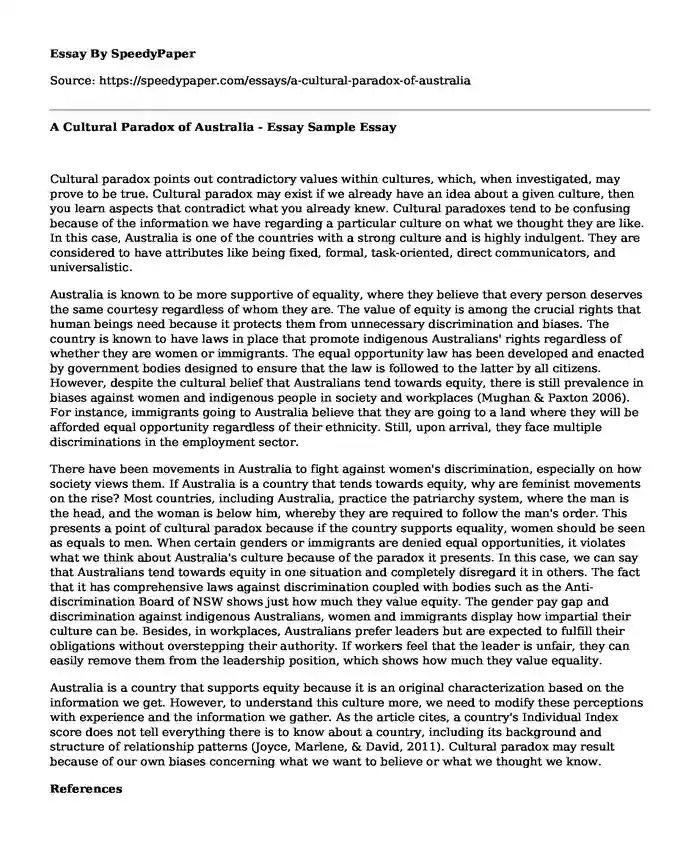
| Type of paper: | Essay |
| Categories: | Culture Discrimination World |
| Pages: | 3 |
| Wordcount: | 608 words |
Cultural paradox points out contradictory values within cultures, which, when investigated, may prove to be true. Cultural paradox may exist if we already have an idea about a given culture, then you learn aspects that contradict what you already knew. Cultural paradoxes tend to be confusing because of the information we have regarding a particular culture on what we thought they are like. In this case, Australia is one of the countries with a strong culture and is highly indulgent. They are considered to have attributes like being fixed, formal, task-oriented, direct communicators, and universalistic.
Australia is known to be more supportive of equality, where they believe that every person deserves the same courtesy regardless of whom they are. The value of equity is among the crucial rights that human beings need because it protects them from unnecessary discrimination and biases. The country is known to have laws in place that promote indigenous Australians' rights regardless of whether they are women or immigrants. The equal opportunity law has been developed and enacted by government bodies designed to ensure that the law is followed to the latter by all citizens. However, despite the cultural belief that Australians tend towards equity, there is still prevalence in biases against women and indigenous people in society and workplaces (Mughan & Paxton 2006). For instance, immigrants going to Australia believe that they are going to a land where they will be afforded equal opportunity regardless of their ethnicity. Still, upon arrival, they face multiple discriminations in the employment sector.
There have been movements in Australia to fight against women's discrimination, especially on how society views them. If Australia is a country that tends towards equity, why are feminist movements on the rise? Most countries, including Australia, practice the patriarchy system, where the man is the head, and the woman is below him, whereby they are required to follow the man's order. This presents a point of cultural paradox because if the country supports equality, women should be seen as equals to men. When certain genders or immigrants are denied equal opportunities, it violates what we think about Australia's culture because of the paradox it presents. In this case, we can say that Australians tend towards equity in one situation and completely disregard it in others. The fact that it has comprehensive laws against discrimination coupled with bodies such as the Anti-discrimination Board of NSW shows just how much they value equity. The gender pay gap and discrimination against indigenous Australians, women and immigrants display how impartial their culture can be. Besides, in workplaces, Australians prefer leaders but are expected to fulfill their obligations without overstepping their authority. If workers feel that the leader is unfair, they can easily remove them from the leadership position, which shows how much they value equality.
Australia is a country that supports equity because it is an original characterization based on the information we get. However, to understand this culture more, we need to modify these perceptions with experience and the information we gather. As the article cites, a country's Individual Index score does not tell everything there is to know about a country, including its background and structure of relationship patterns (Joyce, Marlene, & David, 2011). Cultural paradox may result because of our own biases concerning what we want to believe or what we thought we know.
References
Beyond Sophisticated Stereotyping: Cultural Sensemaking in Context*by Joyce S. Osland& Allan Bird, From Organizational Behavior: The Reader, 2011. Joyce S. Osland, Marlene E. Turner, David A. Kolb, Chapter 12
Mughan, A., & Paxton, P. (2006). Anti-immigrant sentiment, policy preferences and populist party voting in Australia. British Journal of Political Science, 341-358.
Cite this page
A Cultural Paradox of Australia - Essay Sample. (2024, Jan 30). Retrieved from https://speedypaper.com/essays/a-cultural-paradox-of-australia
Request Removal
If you are the original author of this essay and no longer wish to have it published on the SpeedyPaper website, please click below to request its removal:
- Essay Sample on the Historical Background of Poland
- Susie King Taylor's Account. Paper Example
- Fredrick Douglass and Jefferson on Slavery. Paper Example
- Free Essay: Processed Food vs. Healthy food for African-Americans
- Essay Sample on Risk Management Process
- Historical Background of Political Islam - Essay Sample
- Changes in Race Relations from Reconstruction - Paper Example
Popular categories




